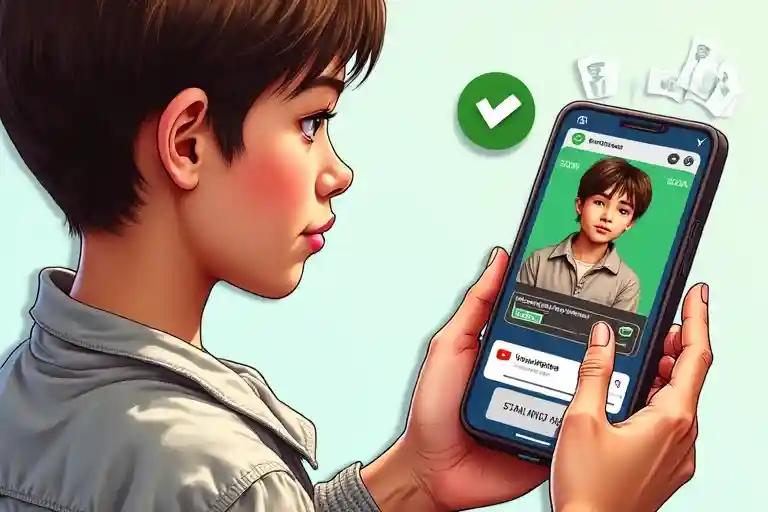Hey everyone! So, you’ve probably scrolled past tons of videos or posts talking about easy ways to make money online. Maybe someone in your TikTok feed flashed a (supposedly) fat stack of cash they made by just… clicking? That brings us to the big question a lot of you might be asking: what are PTC sites? Are they legit? Can you *actually* make bank, or is it all just a massive time sink with little reward? I was super curious myself, and honestly, some of the claims out there are WILD. We’re about to dive deep into the world of Paid-to-Click (PTC) sites. We’ll break down exactly what they are, how they supposedly work, whether you can genuinely earn money by clicking on ads, the difference between legit platforms and total scams, and some crucial safety tips if you’re thinking of exploring them. Plus, we’ll touch upon what the chatter is on places like Reddit regarding these sites and explore if there are better ways for teens like us to make some dough online. Let’s get into it! Last updated: May 2025.
First off, understanding what are PTC sites is key. Imagine a website that pays you tiny amounts of money to click on advertisements. That’s the basic idea. Advertisers pay these PTC sites to get views on their ads, and the PTC sites then share a tiny fraction of that money with users (that’s you!) who click on those ads. It sounds like a dream, right? Getting paid to do something as simple as clicking? Well, it’s a bit more complicated than that, and the “dream” part often has a rude awakening. We’ll explore if this is a path to safe ways for teens to earn or just a digital dead end.
What are PTC Sites to Make Money? The Real Deal
So, you’re wondering specifically what are PTC sites to make money? These platforms position themselves as a super easy entry point into online earning. You sign up (usually for free), and in your dashboard, you’ll see a list of ads to click. Each ad typically requires you to view it for a certain number of seconds – maybe 5 to 30 seconds. After the timer is up, you click a confirmation, and voilà, a tiny amount of money (often fractions of a cent) is credited to your account. Sounds simple, and it is! But “simple” doesn’t always mean “lucrative.”
Hunt? The amount you earn per click is incredibly small. We are talking about zodiac signs like $ 0.001 to $ 0.01 per ad. Think about it: To earn a dollar, you may need to click hundreds, if not thousands, ads. This is a * very * to click. Some PTC sites also provide other ways of promoting revenues, such as the paid surveys, such as completing small tasks (sometimes called micro tasks), or referral programs where you earn a commission if your friends register. Even with these additions, the income capacity is very low for usually invested time. This arcade has a bit like the claw machines in the arcade – feel easy, but really take a price? The harder it seems. It is important to handle expectations; You will not buy the latest iPhone by clicking ads on PTC sites.
How Do PTC Sites Actually Work?
Let’s peek behind the curtain. How do these PTC platforms even function? It’s a triangular relationship: Advertisers, PTC Site Owners, and Users (that’s you!).
- Advertisers Pay PTC Sites: Companies or individuals who want traffic to their websites or want people to see their products pay the PTC site to display their advertisements. They’re essentially buying views, hoping some of those views convert into customers or leads.
- PTC Sites Display Ads to Users: The PTC site takes these ads and lists them for their registered users to click on. The site acts as a middleman.
- Users Click Ads and Get a Small Share: When you click an ad and view it for the required time, the PTC site gives you a tiny portion of what the advertiser paid them. The PTC site keeps the rest as their profit.
So, the PTC site makes money by charging advertisers and then paying out a smaller portion to the clickers. The volume of users and clicks is what makes this model (theoretically) work for the PTC site owner. For advertisers, the quality of traffic from PTC sites is often debated. Are people genuinely interested in the ads, or are they just clicking to earn that fraction of a cent? (You can probably guess the most common answer). This directly impacts how you can get paid for clicking ads effectively, as advertiser interest and budgets fuel the system.
Are PTC Sites Real or Fake? Separating Fact from Fiction
This is the million-dollar question (though you won’t be earning millions, sorry!). Are PTC sites real or fake? The answer is: both. There are *legit* PTC sites that do pay their users, albeit very small amounts. They have a transparent system, clear terms of service, and will actually send you your earnings once you reach the minimum payout threshold (which can sometimes be a challenge in itself, like $5 or $10).
However, the internet is also a bit like the Wild West, and there are MANY scam PTC sites out there. These fakes might promise higher payouts, but they often have no intention of ever paying you. They might make it impossible to reach the payout threshold, suspend your account for no reason right before you’re about to cash out, or simply disappear. It’s like that online “friend” who promises you free V-Bucks but just wants your login details – big yikes! Some scam PTC sites are designed to dupe everyone involved.
Spotting a fake can be tricky, but here are some red flags:
- Unrealistically High Payouts: If a site promises you several dollars per click, run! That’s not sustainable for a real PTC business.
- Requests for Money to Upgrade: Some scams pressure you to pay for premium memberships with the promise of higher earnings. Often, these are just ways to get your money.
- Poor Website Design and Lots of Errors: A professional-looking site isn’t a guarantee, but a sloppy, error-filled site is a major warning.
- No Contact Information or Support: If you can’t find a way to contact them or their support is non-responsive, that’s a bad sign.
- Negative Reviews: Search for reviews before signing up. If many users report not getting paid, steer clear.
Remember, even legit PTC sites offer very low earning potential. So, while they might be “real” in the sense that they pay, they might not be a “real” solution for making significant income.
What are PTC Sites Reddit: Community Insights
When you want the unfiltered truth about something online, where do you often go? Reddit! So, what are PTC sites Reddit discussions saying? Generally, the sentiment on Reddit communities like r/beermoney or r/WorkOnline is pretty skeptical, and for good reason. Many experienced users share that the time investment for PTC sites is rarely worth the payout. You’ll see a lot of posts where people calculate their hourly earnings to be pennies.
However, Reddit also can be an amazing area to discover lists of probably authentic PTC web sites, as users frequently share their charge proofs or warn others approximately scams. You would possibly discover threads discussing techniques to maximise income (like focusing on better-paying gives if available, or green clicking routines), but even these discussions generally include a disclaimer approximately low universal earnings. The fashionable consensus? PTC websites are ok for incomes a tiny bit of pocket change in case you simply have not anything else to do and enjoy the senseless clicking, but they’re not a dependable source of profits. Some Redditors evaluate it to picking up pennies off the street – you may want to do it, however is it the satisfactory use of it slow? Probably not. One user summed it up like, “It’s like looking TikToks however as opposed to guffawing, your soul slowly leaves your frame for $0.001.” Brutal, however kinda captures the vibe!

PTC Sites in India and Beyond: An International Look
While our focus is generally on what’s relevant for American teens, it’s interesting to note the global landscape. The query “PTC sites in India” is a common one, indicating significant interest there. PTC sites are popular in many countries, especially where other online earning opportunities might be less accessible or where even small amounts of US dollars can be more significant due to currency exchange rates. The mechanisms are largely the same worldwide: click ads, earn tiny amounts. However, users in different regions might face different challenges, such as varying availability of offers or payment methods.
For international teens, including those in the US, the core advice remains the same: be cautious, manage expectations, and prioritize safety. Regardless of your location, the very low earning potential is a universal characteristic of PTC sites. Cultural context might change *why* someone uses PTC sites – perhaps as a very first step into online earning or to accumulate tiny amounts for a specific small online purchase – but it doesn’t change *how much* (or how little) can be earned. It’s important to find resources that discuss paying PTC sites to earn cash with a realistic perspective.
Paid to Click Sites: Are They Worth Your Screen Time?
So, we’ve established what paid to click sites are. Now for the big evaluation: are they worth your precious screen time? For most teenagers, the answer is likely no, especially if you’re looking to earn any meaningful amount of money. Think about it: your time is valuable. You could be spending it on homework, learning a new skill, engaging in hobbies, or even exploring other online earning methods that have a much higher potential return.
Let’s do some quick math. If you earn an average of $0.005 per click and each click takes about 15 seconds (including loading time and confirmation), you’d make:
$0.005/click * 4 clicks/minute = $0.02/minute
$0.02/minute * 60 minutes/hour = $1.20/hour
…IF you have a constant stream of ads and click non-stop. In reality, ads can run out, and maintaining that pace is draining. Compare this to, say, minimum wage jobs (if you’re old enough) or even other online gigs like freelance writing, graphic design for beginners, or paid surveys from more reputable companies, which often pay better for your time. The opportunity cost of PTC sites is high – the time you spend clicking for pennies could be invested in something far more rewarding, both financially and personally. Imagine trying to save up for a new game or concert tickets through PTC clicks alone. You’d be clicking until your next birthday, and maybe the one after that!
PTC Ads Earn Money: But How Much REALLY?
When you see “PTC ads earn money,” it’s technically true. You *do* earn money. But the emphasis should be on *how little*. Most people who try PTC sites for a while report earning only a few dollars a month, despite spending several hours. It’s a far cry from the “easy cash” dream that might be portrayed. Some users stick with it out of habit or because they enjoy the gamified aspect of reaching a payout, but it’s crucial to be realistic.
Think of it like this: you wouldn’t accept a job that pays you less than a dollar an hour in the real world, right? So why do it online? The allure of “easy” can be strong, but “easy” often translates to “low value.” It’s like those mobile games that promise huge payouts but are riddled with ads and make it nearly impossible to cash out actual money. They’re designed to keep you engaged, not necessarily to make you rich. For a more comprehensive look at the earning potential, resources like “Get Paid to Click Ads: Are PTC Sites Worth It?” can offer further insights.
Table: PTC Sites vs. Other Teen Earning Methods
Let’s compare PTC sites with a couple of other options available to teens. This isn’t exhaustive, but it gives you an idea.
| Earning Method | Typical Earnings | Time Investment | Skill Required | Pros | Cons |
|---|---|---|---|---|---|
| PTC Sites | $0.10 – $2 per hour (optimistic) | High (for low returns) | Very Low (just clicking) | Extremely easy to start, no skills needed. | VERY low pay, can be boring, risk of scams, eye strain. |
| Online Surveys | $1 – $5 per survey (surveys can take 10-30 mins) | Moderate | Low (giving opinions) | Relatively easy, can do anytime. Some paid to click websites also offer surveys. | Can be disqualified often, sometimes boring, payouts can be slow. |
| Beginner Freelancing (e.g., simple graphic design, writing, social media tasks) | $10 – $20+ per hour (once established) | Moderate to High (includes finding clients & doing work) | Moderate (specific skill) | Much higher earning potential, builds valuable skills, flexible. | Takes time to find work, need a skill, can be inconsistent at first. |
| Local Gigs (e.g., babysitting, dog walking, tutoring younger kids) | $10 – $20+ per hour | Varies | Low to Moderate (responsibility, specific subject for tutoring) | Good pay, often cash in hand, builds responsibility. | Limited by local demand, might require parental help for transport/safety. |
Looking at this, you can see why many teens might initially be drawn to what are PTC sites due to the low barrier to entry, but the payoff just isn’t there compared to other avenues. Even short click and get paid site tasks usually don’t beat dedicated skill-building.
Paid to Click Legit: Finding Trustworthy Platforms (If You Must)
Okay, so maybe after all this, you’re still a little curious, or you have a *lot* of free time and just want to see what it’s like. If you are determined to try paid to click legit sites, how do you find ones that are less likely to be scams?
- Do Your Research: Search for reviews of any PTC site *before* you sign up. Look for reviews on multiple platforms, not just one. Check forums like Reddit or dedicated review sites.
- Look for Payment Proofs: Some users share screenshots of payments they’ve received. While these can be faked, consistent, recent payment proofs from multiple users are a better sign.
- Check Longevity: Sites that have been around for several years are generally more stable than brand new ones (though this isn’t foolproof).
- Read the Terms of Service: Yes, it’s boring, but it can tell you a lot about payout thresholds, how they handle disputes, and reasons they might suspend accounts.
- Start Small: Don’t invest any money (e.g., for upgrades) until you’ve successfully received a payment and trust the site. Honestly, it’s best never to pay to join or upgrade on a PTC site.
- Use a Strong, Unique Password and a Secondary Email: Protect your main email from spam and use good password hygiene.
Some well-known names in the PTC/GPT (Get-Paid-To) space that have been around for a while include sites often reviewed by blogs like JumpTask in their “Best GPT Sites” articles. However, even with these, remember the earnings are low. It’s crucial to approach this with eyes wide open. The phrase “paid to click legit” is more about “they actually pay out the pennies they promise” rather than “this is a legitimate way to make good money.”
Safety First: Navigating PTC Sites Without Getting Burned
Safety is HUGE, especially for teens online. If you’re exploring what are PTC sites, you MUST prioritize your online safety.
- Parental Guidance: Seriously, talk to your parents or a trusted adult before signing up for *any* site that involves money or personal information. They can help you spot red flags and make sure it’s appropriate. This is non-negotiable.
- NEVER Share Sensitive Personal Information: You shouldn’t need to provide your Social Security number, bank account details directly (PayPal is common, which is safer), or credit card info to a PTC site just to click ads. If they ask for too much, it’s a major red flag.
- Beware of Downloads: Some scammy PTC sites or the ads they display might try to get you to download software or files. Unless you are 1000% sure it’s from a legitimate source and necessary, DON’T download anything. It could be malware or spyware. That’s like finding a random USB stick on the ground and plugging it into your computer – super risky!
- Use an Ad Blocker (Ironically): While the point is to view ads, having a good ad blocker and antivirus software running can protect you from malicious pop-ups or redirects that might come from the *advertisers* on less reputable PTC sites.
- Don’t Pay to Earn: Any site that asks you to pay a fee to join or to unlock higher earnings is often a scam. Legitimate ways to earn shouldn’t require you to pay upfront.
- Trust Your Gut: If something feels off or too good to be true, it probably is. That little voice in your head saying “Hmm, this seems kinda sketchy”? Listen to it! It’s usually right.
Exploring what are PTC sites can seem like an easy venture, but the path is often paved with more clicks than coins, and potential pitfalls. Remember the TikTok trend where someone tries a “life hack” and it epically fails? That can be PTC sites for income generation. You try it expecting magic, and you end up with… well, a lot of wasted clicks.

Conclusion
So, after all this, what are PTC sites? They are platforms where you can earn very small amounts of money by clicking on advertisements. While some are legitimate in that they do pay out, the earning potential is extremely low for the time invested. For most teens, especially in places like the US, your time would likely be much better spent on developing skills, focusing on education, or pursuing other online or offline avenues that offer better returns and personal growth. It’s not the “get rich quick” scheme some might (falsely) portray. Think of it more as a curiosity than a serious earning strategy.
Ultimately, the decision is yours, but go in with realistic expectations and prioritize your safety above all else.
What do you think? Have you tried PTC sites? Share your experiences in the comments below – let’s learn from each other! And if you found this helpful, why not share it with your friends on TikTok or Instagram? Help them stay informed too!
Stay tuned to zana.website for more insights into online earning, safety tips, and ways to make your time online productive and fun! We’re always updating our content with new platforms and changes in online earning landscapes.
Frequently Asked Questions
1. Are PTC sites real or fake?
PTC sites can be both. Some are legitimate and will pay you small amounts for clicking ads, but many are scams designed to waste your time or steal information. It’s crucial to research any PTC site thoroughly before using it and be wary of promises of high earnings, as legit ones pay very little.
2. Can I make money by clicking on ads?
Yes, you can technically make money by clicking on ads through PTC sites, but the amounts are extremely small – often fractions of a cent per click. It typically takes a very long time to earn even a few dollars, making it an inefficient way to make money for most people.
3. What are PTC sites?
What are PTC sites? They are “Paid-to-Click” websites that act as middlemen between advertisers and consumers. Advertisers pay these sites to display their ads, and the sites then pay users (like you) a tiny fraction of that money for viewing those ads for a few seconds.
4. How does PTC make money?
PTC sites primarily make money by charging advertisers fees to display their advertisements to the site’s users. The PTC site then pays out a smaller portion of these fees to the users who click on and view the ads, keeping the difference as their profit. They rely on a large volume of advertisers and users.
5. What is PTC advertising?
PTC advertising refers to a model where advertisers pay to have their ads displayed on PTC (Paid-to-Click) websites. Users on these sites are then incentivized with small monetary payments to click on and view these ads for a specified duration. It’s a way for advertisers to get views, though the quality of engagement is often debated.









